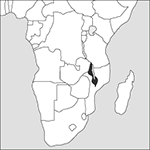
Source: MAPS IN MINUTES™ © RH Publications (1997)
Capital:
Lilongwe
Area:
118,484 sq km (45,747 sq miles)
Population:
16,777,547 (2013 est)
Currency:
1 kwacha=100 tambala
Religions:
Christian 82.6%; Muslim 13.0%
Ethnic Groups:
Chewa 32.6%; Lomwe 17.6%; Yao 13.5%; Ngoni 11.5%; Tumbuka 8.8%; Nyanja 5.8%
Languages:
English (official); Chichewa; local languages
International Organizations:
UN; Commonwealth; Non-Aligned Movement; AU; SADC; WTO
A long, narrow, landlocked country running north to south in south-eastern Africa. Its eastern boundary includes much of Lake Malawi; Tanzania is to the north and Zambia to the west, while Mozambique almost encloses its southern half.
Physical
Malawi lies at the southern end of the Great Rift Valley. The Shire River falling from Lake Malawi is flanked by high ground until it enters swampland, with three smaller lakes. To the north the ground rises westward from the lake to plateaux.
Economy
The economy is mainly agricultural, exports being dominated by tobacco (which provides over half of export earnings), sugar, and tea. The main industries are the processing of these products. Cotton, maize, and potatoes are also grown. The only mineral resource is bauxite. Electricity is generated almost exclusively from hydroelectric sources.
History
The area has been inhabited since at least 8000 bc, and several kingdoms had risen and fallen before Malawi was first explored by the Portuguese in the 17th century. Slave-traders from Zanzibar raided the area frequently in the 1840s, and its desolation is described by Livingstone in 1859. In 1875 Scottish missionaries settled, and for a while governed parts of the country. Colonial administration was instituted when Sir H. H. Johnston proclaimed the Shire Highlands a British Protectorate in 1889. This became British Central Africa in 1891, then Nyasaland from 1907 until 1964. Unwillingly a member of the Central African Federation (1953–63), it gained independence (1964) as Malawi, with Dr Hastings Banda as first Prime Minister. When the country became a republic in 1966, he became President and was proclaimed Life President in 1971. Malawi was a one-party state until the early 1990s, when opposition to this system increased and all non-humanitarian aid from the West was suspended. Banda held a referendum on the issue in October 1992 and the adoption of a multiparty political system was approved. Elections in 1994 were won by the United Democratic Front (UDF), with Bakili Muluzi becoming President; he was succeeded in 2004 by Bingu wa Mutharika. After Mutharika was re-elected in 2009, he became increasingly autocratic, concerned more with maintaining power than tackling Malawi’s serious economic problems. He died suddenly in 2012 and was succeeded by his deputy, Joyce Banda, with whom he had fallen out. She became the first female southern African leader and established a reformist administration. However, elections in 2014 saw victory for Peter Mutharika, brother of the former President Mutharika.
- colour centre
- colour charge
- negative theology
- negative transmission
- negator
- negentropy
- Negroids
- Neher, Erwin
- Nehru, Jawaharlal (1889–1964)
- Nehru, Motilal (1861–1931)
- nehrung
- neighbour
- neighbourhood
- neighbourhood effect
- neighbourhood semantics
- neighbouring-group participation
- Neisser, Albert Ludwig Siegmund
- nekton
- Nelder, John Ashworth (1924–2010)
- Nelder–Mead simplex method
- Nelson, George Driver (1950– )
- Nelson, Horatio, Viscount Nelson, Duke of Bronte (1758–1805)
- Nelson–Aalen estimate
- Nelson–Farrar cost index
- nema